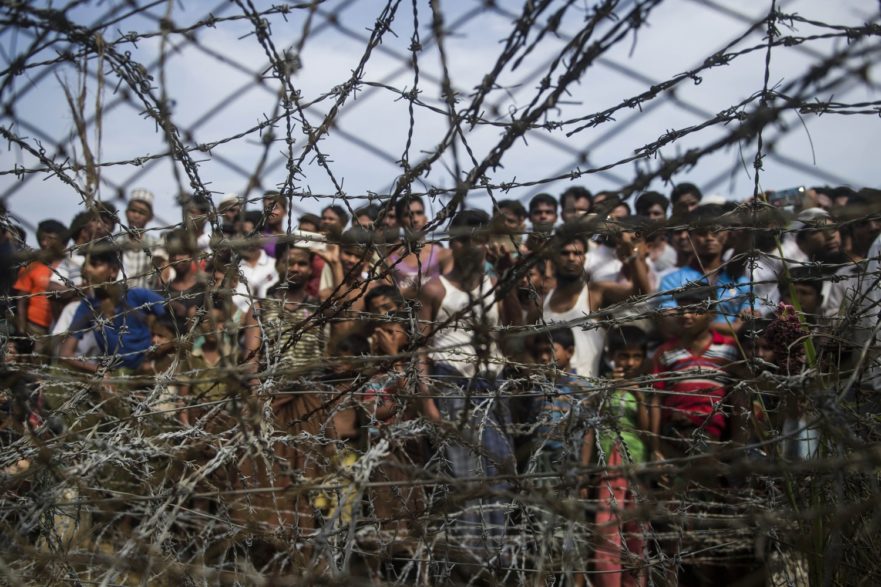House Foreign Affairs Committee Chairman Gregory W. Meeks (D-NY), House Foreign Affairs Asia-Pacific Subcommittee Ranking Member Steve Chabot (R-OH) and Senator Benjamin L. Cardin (D-MD) introduced the “Burma Unified through Rigorous Military Accountability Act of 2021” or BURMA Act.
The legislation condemns the actions taken by the Burmese military during its February 1 coup d’état and its aftermath. By authorizing targeted sanctions against the Burmese military, the State Administrative Council, as well as their affiliated entities and conglomerates, the bill holds accountable those responsible for the perpetration of the coup and the ensuing atrocities that have claimed over a thousand lives. In light of the growing crisis in Burma, the legislation also authorizes support for civil society and humanitarian assistance and calls on the State Department to issue a genocide determination for the persecution of the Rohingya.
“It has been eight long months since the Burmese military staged its illegal and illegitimate coup, reversing years of reform and Burma’s fragile transition to democracy. Despite diplomatic pressure from the United States and the international community, the Burmese military has refused to cease its violence, release those unjustly detained, or participate in meaningful dialogue with local stakeholders. The United States must do more to support and protect the Burmese people and send a clear signal to the Burmese military,” said Chairman Meeks.
“The Burmese military’s coup in February, and the ongoing atrocities that have followed, continue to be a direct attack on the people of Burma and their basic desire for self-government. Self-government is not some sort of temporary arrangement or gift from the military. The people of Burma have had enough of military rule and, to their credit, have courageously stood up for their legitimate democratic aspirations. As a longtime champion of human rights in Burma, I’m proud to join Chairman Meeks to introduce this legislation which will authorize a forceful response to these heinous crimes,” said Representative Chabot.
“As the death toll continues to rise, the United States must not be indifferent to Burma’s fate. Horrible atrocities have been committed against minority groups, including the Rohingya, which has led more than one million to flee as refugees. Our bicameral legislation aims to hold responsible the military leaders and others who have ravaged this nation and committed crimes against humanity. We stand in solidarity with the people of Burma and condemn the violence that has been perpetrated against them,” said Senator Cardin.
“Despite the Burmese people making their wishes clear through the November 2020 elections and subsequent peaceful protests, the Tatmadaw upended the country’s democratic process with a ruthless coup. In just eight months since, over 1,000 civilians have been murdered by the military and the democratically elected leaders remain jailed behind bars. It’s imperative that the United States and the global community not lose sight of the ongoing atrocities occurring in Burma. I am proud to stand with my colleagues in introducing the bipartisan BURMA Act to reaffirm the United States’ commitment to the people of Burma and their aspirations for their country and democracy,” said Asia-Pacific Subcommittee Chair Ami Bera.
A copy of the BURMA Act of 2021 can be found here.
On February 1st of 2021, the military of Burma launched a coup to overthrow the country’s democratically elected government. People have taken to the streets across Burma, also known as Myanmar, to protest against the coup. Myanmar’s elected leader, Aung San Suu Kyi, has been detained along with members of her party, the National League for Democracy (NLD). The coup threatens to further inflame the ongoing violence perpetrated by the military for years against ethnic and religious minorities, with the military destroying whole villages and places of worship for Christians, Muslims, and other minority communities.
The U.S. Commission on International Religious Freedom (USCIRF) has monitored religious freedom conditions in Burma (also known as Myanmar) since the Commission first began its work in 1999. In its 2020 Annual Report, USCIRF recommended that the State Department designate Burma as a “Country of Particular Concern” for engaging in systematic, ongoing, and egregious violations of religious freedom, as defined by the International Religious Freedom Act (IRFA). The Burmese government and military continue to commit widespread and egregious religious freedom violations, particularly against Rohingya Muslims – nearly one million of whom have been driven out of the country into refugee camps in Bangladesh. Ethnic-driven conflict and degradation of other civil rights in this majority Buddhist country often coincide with religious differences, thereby severely restricting freedom of religion or belief.
Shortly after the coup took place, 21Wilberforce launched a campaign to support freedom for the people of Myanmar. Advocacy campaigns are pivotal to securing lasting change to combat religious oppression. The greater the public support for a cause, the more likely policy-makers will adopt and prioritize issues.
Campaign components include a resource page in the 21Wilberforce online Freedom Center rich with a situation analysis and news on the situation in Burma, a fact sheet and list of action items that the public can engage in to stand with the citizens of Burma including specific prayer requests, a social media idea and information on how to contact members of Congress to encourage them to support the democratic rights of the Burmese people.

